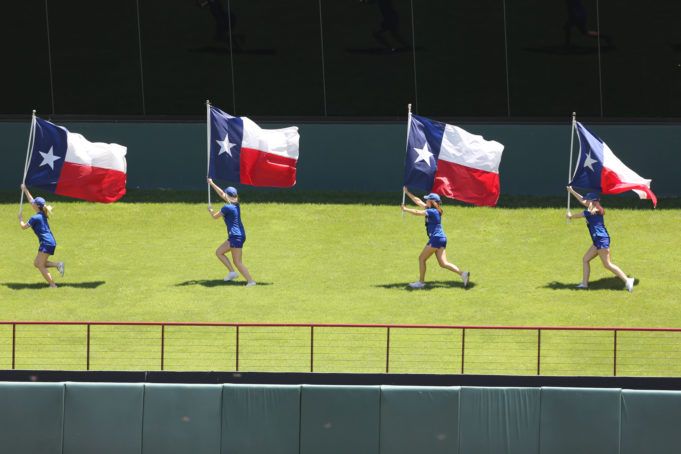2017’s original baseball schedule had the Rangers and Astros playing this Tuesday-Thursday in Houston. Hurricane Harvey forced the Astros to move those games. Reports indicate Houston proposed playing this week’s games at Globe Lift Park in Arlington and the Rangers would then come to Houston for three late September games currently scheduled for Arlington.
The Rangers offered to play all six games in Arlington, with Houston being designated the home team this week and receiving all the revenue from the contests, which they could then pocket or donate. The Astros declined that option, which was their option as the home team, worried, apparently, about affecting the competitive balance of the games. The Rangers expressed concerns about compromising their ticket buyers who held seats for the late September games and would have little notice to change their own schedules. They also were likely concerned about the 12-game road trip with which they would have been left in September during a potentially crucial competitive period.
The Rangers have come under a great deal of criticism for their stance, with many apparently believing the most compassionate response would have been to swap the series.
Here are some factors that could have been considered in making the decision about the games and in evaluating that decision afterward.
The Business Side
If you want to maximize the total number of fans who will see the six total games remaining between the teams, as Major League Baseball might, you play all the games in Arlington, because rescheduled games always draw poorly, as do neutral-site games.
If you want to inconvenience only one fan base instead of two, you leave the September games in Arlington. The Houston fans already, though no fault of their own, have no way to go to a ballgame in their town during the early part of this week. From my experience in teams’ front offices, I can tell you that the argument that most fans holding tickets to the September games won’t use them for rescheduled weeknight games a few days notice is a legitimate one. Hurricane Harvey forced Astros fans to miss games for which they held tickets, Should it force Rangers fans to do the same?
Even if one rescheduled September’s games for Houston, there is substantial question as to how many fans would be able to make the games even by that point, given the large number of people whose lives were substantially disrupted. Monday-Wednesday games during the school year are a tough draw anyway.
If you want to maximize the amount of money raised for the relief efforts, you play the three games this week in Arlington. You’ll draw home fans and those who had to relocate from South Texas. You won’t draw much at all in Florida. Whether you donate gate receipts or simply collect donations, you’ll get more for the victims playing in Arlington. So if that’s your priority, you play the games there no matter what happens in September.
The Baseball Side
Playing this week’s games in Arlington would place the Houston players closer to their families than any out-of-state option. If one considers this a crucial factor, given how recently the disaster happened, one plays those games in North Texas no matter what deal one has to make.
It is a virtual certainty the Astros will make the 2017 postseason. The Rangers still face challenges to do so. Strictly from a competitive standpoint, that would seem to indicate that the Arlington team should be the one to get the on-field advantage here if one is to be had. Many have said the Rangers will be out of the race by the end of September, but you simply cannot make that assumption with so many games left to play.
Related to the business-side items above, what advantage does playing at home confer? Getting to bat last is one, but that can be easily changed for a given series. Being more familiar with the angles of the home park is another, and while that’s not irrelevant, Houston is at least as familiar with Globe Life Park as any other facility other than their own because they share a division with the Rangers and therefore play multiple series there each season. The other advantage conferred is playing in front of a home crowd. A rescheduled series would result in small home attendance numbers for the Rangers this week, so they wouldn’t get much of the home crowd advantage. Houston would be likely to have tiny draws as well for a late-added September series, but they’d have a month to prepare. If the Rangers drew 10,000 (probably a generous estimate) to this week’s games and the Astros draw 15,000 each in September, the latter have effectively used the disaster to give themselves a competitive advantage if one believes fan support aids winning.
You could play a series this week in Minute Maid Park without fans. The field was apparently playable, so if you’re all about competitive balance and you won’t draw good crowds no matter where you play, make special arrangements to do it there. It’s not a good solution, and would probably be harder than it sounds, but it solves the issue of park dimensions and at least makes the crowd a neutral factor. The Astros will, in fact, play the Mets there this weekend.
You could also play this week’s games at a minor league or college ballpark in Texas or Oklahoma. The Frisco Roughriders and Round Rock Express had schedule conflicts, but swapping minor league series is less of a big deal than swapping big league ones, so those parks could be freed up. If you’re not going to draw well anyway, the smaller capacities wouldn’t matter.
If maintaining competitive balance is all-important here, and business considerations are to be put out the window, and if we decide that a 12-game road trip late in the season is unduly hurtful to the Rangers’ chance, then get a third team involved. Have the out-of-the-running A’s flip their September 22-24 home series with the Rangers for the one currently scheduled in Arlington for September 28-30. Then you move the Rangers’ series with the Astros to Houston and still give Texas a balance of home and road games. That’s incredibly disruptive from a business standpoint, but if all you’re concerned about is the on-field stuff, that solves that issue.
Summary
Both teams no doubt balanced competitive considerations with fan-related and community-related ones. The situation is a lot more nuanced than knee-jerk criticism would indicate.












